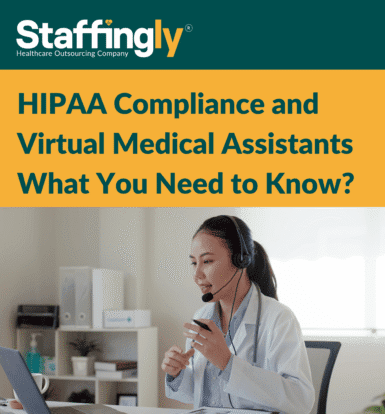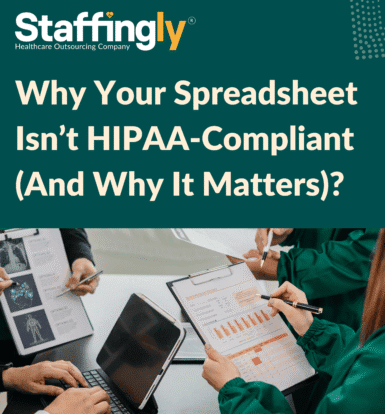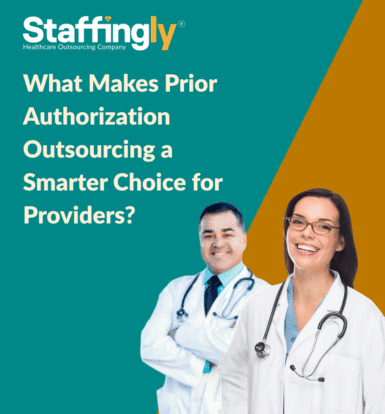On-Demand Outsourcing BPO Services for Healthcare Providers With 24/7 Coverage!
Save up to 70% on staffing costs!
Browse Specialty Staffing Services
HIPAA Compliance and Virtual Medical Assistants What You Need to Know?
Virtual medical assistants (VMAs) are quickly becoming essential to healthcare practices across the U.S. By handling administrative tasks like scheduling, billing, patient communication, and record-keeping, VMAs are saving providers time, reducing overhead, and improving patient care. But with these increased efficiencies comes a major responsibility: safeguarding patient information. HIPAA compliance is a critical element when leveraging the power of VMAs, and getting it right is key to maintaining your practice’s integrity and patient trust. In this article, we’ll explore how

How Staffingly Streamlines Prior Authorization and Saves Provider Time?
Prior authorization (PA) is intended to serve as a safeguard in healthcare, ensuring that treatments are medically necessary, aligned with clinical guidelines, and evidence-based. Payers rely on it to curb unnecessary spending and protect patients from potentially ineffective or harmful interventions. While the intent is noble, the real-world experience tells a different story. For many providers, PA feels less like a clinical checkpoint and more like a bureaucratic roadblock one that slows down care, overwhelms administrative teams, and drains valuable

Why Your Spreadsheet Isn’t HIPAA-Compliant (And Why It Matters)?
In today’s fast-paced healthcare environment, managing patient data securely is more important than ever. Many healthcare providers rely on spreadsheets for scheduling and keeping track of sensitive patient information. However, if you’re using a regular spreadsheet program like Excel to manage this information, you could be putting your practice at serious risk of non-compliance with HIPAA regulations. This is why adopting HIPAA-compliant scheduling systems is crucial for safeguarding your practice and your patients’ privacy. Key Takeaways Spreadsheets aren’t built for

Virtual Medical Assistants: The Future of Efficient Medical Data Entry
In today’s fast-paced healthcare environment, medical professionals face mounting pressure to manage increasing amounts of patient data while maintaining accuracy and compliance. Enter virtual medical assistants—AI-powered tools designed to streamline medical data entry. These digital helpers not only save time but also reduce errors, allowing healthcare providers to focus more on patient care. Dr. Smith: Hey Joe, have you started using that new virtual medical assistant in your practice yet? Dr. Joe: Yeah, I have! Honestly, it’s been a game-changer.

What Are the Benefits of a HIPAA-Compliant in Virtual Assistant?
Running a healthcare practice today means wearing a lot of hats. It’s not just about diagnosing and treating patients anymore. You’re juggling appointment scheduling, billing, documentation, patient messages—and that’s before lunch. Now add strict HIPAA regulations into the mix, and it’s easy to see why many providers feel overwhelmed. That’s where a HIPAA-compliant virtual assistant comes in. Think of them as an offsite support hero—trained, secure, and ready to help without compromising patient privacy. When it comes to streamlining operations,

What Makes Prior Authorization Outsourcing a Smarter Choice for Providers?
In today’s healthcare landscape, delivering quality care is no longer just about accurate diagnoses and effective treatment—it’s also about managing the growing administrative burden that comes with insurance coordination. One of the most complex and time-consuming administrative tasks is prior authorization (PA), a process that can easily overwhelm clinical teams and disrupt workflow. For U.S. healthcare providers, the decision to outsource prior authorization isn’t just about convenience. Instead, it represents a strategic choice that actively promotes compliance, improves operational efficiency,

How Does Outsourcing Improve Regulatory Compliance in Prior Authorization Workflows?
Prior Authorization (PA) is a vital administrative process that ensures treatments, medications, and diagnostic procedures meet medical necessity and payer requirements before being delivered to patients. However, as healthcare regulations continue to evolve in the U.S., managing prior authorizations in-house has become increasingly difficult for physicians, clinics, and hospital systems. As a result, with mounting pressure to stay compliant with payer rules and federal mandates, many providers are now turning to outsourcing for their prior authorization workflows. By doing so,

Why Are HIPAA-Compliant Medical Credentialing Services Essential for Neonatologists?
When it comes to caring for the tiniest and most vulnerable patients, neonatologists carry a profound responsibility. But their specialized expertise in newborn care isn’t the only demand of the profession — navigating the maze of medical credentialing is just as critical. Credentialing ensures that neonatologists meet the required standards to deliver care in hospitals, NICUs, and through insurance networks. However, the complexity of the process — spanning licensure, hospital privileges, payer enrollment, and regulatory compliance — can quickly overwhelm
 Book a Demo to Build Your Team Today!
Book a Demo to Build Your Team Today!


 Read Case Studies
Read Case Studies 



 Virtual Medical Assistants
Virtual Medical Assistants



